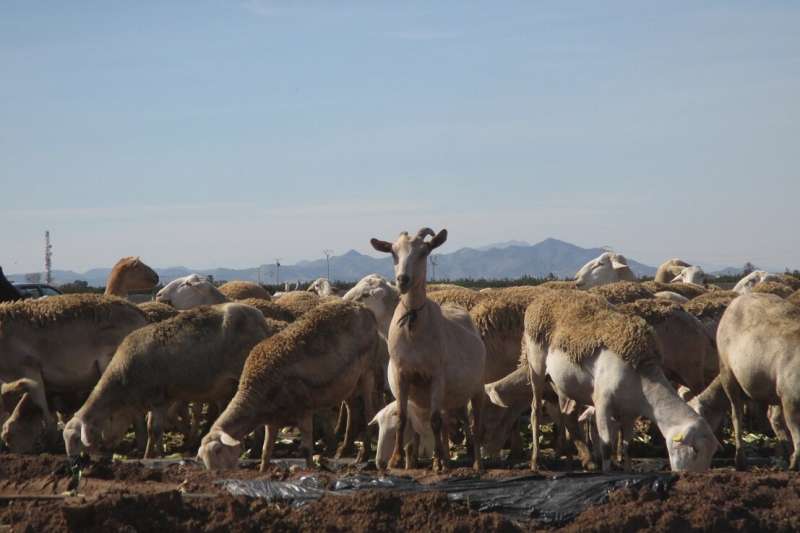Sheep show the contamination by microplastics in the agricultural soils of Murcia

In recent times, the increase in plastic residues has been reasserted as being a major environmental problem. This material, which is present in packaging and day-to-day objects, plays a decisive role in intensive agriculture zones.
In the Region of Murcia, known as 'Europe's market garden,' mulch film (plastic covering over the crop lines) increases production in vegetable fields, but involves using large amounts of plastic. This low-density plastic is difficult to completely remove from the fields and, with time, decomposes into smaller particles which are absorbed by the soil, transported by water or wind, and are also ingested by other animals.
In order to know the status of contamination by microplastics in this zone, researchers from the universities of Wageningen and Cartagena analyzed the presence of these plastics in agricultural soil, and also in sheep feces, to determine the possible ingestion of plastics by the livestock that feed on post-harvest agricultural residues.
They found that 100% of the soil samples analyzed contained microplastics, as did 92% of the samples of sheep feces studied. This, in turn, translates into concentrations of 2,000 particles of microplastics per kilogram of soil, and 1,000 particles per kilogram of dry feces.
This analysis reveals a relevant concentration of plastics and warns about the ingestion of this material by sheep; future studies should analyze how ingesting the plastic affects the organism of these animals.
Despite the negative effects of the plastic and its accumulation in intensive agriculture zones, it is very difficult to do away with that material since techniques such as the use of mulch film enable savings in water and pesticides; these prove to be determining factors in semi-arid zones with scant rainfall, as is the case of the Murcia zone.
Reverting this trend will therefore require a change in paradigm in current agricultural production so as to relegate intensive cropping to a secondary role. The Diverfarming project, financed by the H2020 call of the European Commission seeks, in this sense, to bring about a change in European agriculture towards an agriculture that is more sustainable and respectful to the environment. By means of the combination of crop diversification and sustainable farming practices they seek to look after the planet whilst ensuring the farmers' economic benefits.
More information: Nicolas Beriot et al, Low density-microplastics detected in sheep faeces and soil: A case study from the intensive vegetable farming in Southeast Spain, Science of The Total Environment (2020). DOI: 10.1016/j.scitotenv.2020.142653
Journal information: Science of the Total Environment
Provided by University of Córdoba





















